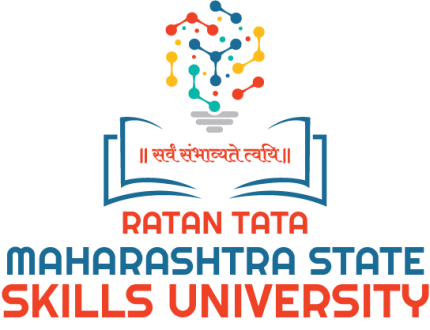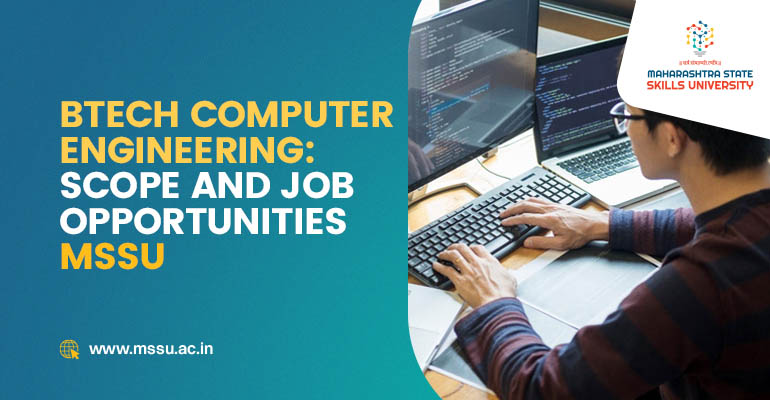BTech Computer Engineering: Scope and Job Opportunities in 2024-25
August 26, 2024 2025-07-05 10:27BTech Computer Engineering: Scope and Job Opportunities in 2024-25
Do you aim to become a software engineer by enrolling in a B.Tech. Computer Engineering program? If so, you’ve come to the correct spot and chosen an article that will give you in-depth information on the B.Tech. Computer Science Engineering degree. The Bachelor of Technology in Computer Engineering is a four-year undergraduate degree program designed for individuals interested in jobs as software or IT engineers.
Overview of the BTech Computer Engineering
The B.Tech. Computer Science Engineering Course is a four-year undergraduate curriculum separated into eight semesters that prepares students to work as software engineers in the IT sector. Because of its high demand and benefits, the B.Tech. computer science degree has increased in popularity in India, with the bulk of students enrolling after finishing their 12th grade.
Essential Skills for Success in a B.Tech. Computer Science Program
Pursuing a B.Tech. in Computer Science requires mastering a broad set of skills that are critical for academic success and future career opportunities. Here’s an overview of the essential skills students should focus on:
1. Proficiency in Programming Languages
Understanding and becoming proficient in programming languages like Python, Java, C++, and JavaScript is fundamental. Python is known for its simplicity and versatility, making it ideal for beginners and useful for tasks such as web development, data analysis, and machine learning. Java’s portability and robustness make it a go-to for enterprise-level applications and Android development. C++ offers performance and control, which are crucial for system-level programming and game development. JavaScript is indispensable for web development, allowing students to create dynamic and interactive websites. Mastering these languages not only helps in understanding different programming paradigms but also enhances problem-solving abilities and flexibility in tackling various projects.
2. Mastery of Data Structures and Algorithms
A strong foundation in data structures and algorithms is crucial for effective problem-solving. Data structures such as arrays, linked lists, stacks, queues, trees, and graphs organize and manage data efficiently. Algorithms like sorting, searching, and dynamic programming provide the methods to manipulate these structures to solve complex problems.
Understanding these concepts improves coding efficiency and is essential for success in technical interviews, where candidates must demonstrate their ability to apply these principles to solve problems.
3. Knowledge of Computer Networks
An understanding of computer networks, including networking architectures, protocols, and concepts, is essential. This knowledge helps in grasping how data is transmitted securely over the internet. Students should be familiar with concepts such as IP addressing, DNS, HTTP/HTTPS, and network security, as these are fundamental to designing and managing networked systems.

Call Us For Any Query:- (+91) 86559 46646/47
4. Familiarity with Operating Systems
Proficiency in operating systems is crucial for system-level programming and optimization. Students need to understand how operating systems manage memory, processes, and file systems. This knowledge is fundamental for tasks such as performance tuning and developing software that interacts closely with system resources.
5. Expertise in Database Management
Database management is another key area, involving the design, implementation, and manipulation of databases. Proficiency in SQL and database management systems (DBMS) is necessary for tasks such as data storage and retrieval. Understanding how to structure data and execute queries efficiently is crucial for backend development and data analysis.
6. Skills in Software Development and Version Control
In modern software development, knowledge of collaborative tools and version control systems like Git is vital. These tools help manage code changes, collaborate with other developers, and maintain a history of code revisions. Familiarity with Agile methodologies further enhances the ability to work in teams and manage projects effectively.
7. Strong Problem-Solving and Analytical Skills
Critical thinking and analytical skills are essential for tackling complex computing challenges. Developing these abilities enables students to approach problems methodically and devise effective solutions, which is crucial for both academic success and professional growth.
8. Solid Foundation in Mathematics and Logic
A strong mathematical background supports various areas of computer science. Knowledge of discrete mathematics, linear algebra, probability, and statistics is important for algorithm development and computational theory. Mathematics provides the tools for understanding and solving complex problems and is integral to fields such as machine learning and data analysis.
9. Web Development and Design
Proficiency in both front-end and back-end web development is valuable. Skills in HTML, CSS, and JavaScript are essential for creating user interfaces, while knowledge of back-end technologies like Node.js and Django is crucial for server-side development. This combination enables students to design and manage comprehensive web applications.
10. Development of Soft Skills
Effective communication, teamwork, and adaptability are important for success in both academic and professional settings. Good written and verbal communication skills aid in documentation and collaboration, while the ability to work well with others is essential for completing group projects and working in team environments. Moreover, staying flexible and open to ongoing learning is critical in the ever-evolving field of technology.
Focusing on these areas will greatly enhance a student’s capabilities and prepare them for a successful career in computer science.
Top 10 Career Opportunities After a B.Tech. in Computer Engineering in 2024-25
Graduating with a B.Tech. in Computer Science and Engineering opens doors to a multitude of exciting and lucrative career opportunities. Here’s an overview of the ten top career paths you can pursue:
1. Computer Hardware Engineer
Computer Hardware Engineers are responsible for designing, developing, and testing physical components of computers and related devices. This role involves working with circuit boards, processors, memory devices, and other hardware components. Engineers in this field may work on developing new hardware technologies or improving existing systems. Opportunities are available in sectors ranging from consumer electronics to industrial equipment and beyond.
2. Computer System Analyst
Computer System Analysts evaluate and enhance computer systems for organizations to improve efficiency and productivity. They assess system requirements, design solutions, and integrate new technologies with existing systems. This role requires a blend of technical knowledge and business acumen to ensure that technology solutions align with organizational goals. Analysts often work in various industries, including finance, healthcare, and manufacturing.
3. Software Developers
Software Developers design, create, and maintain software applications or systems tailored to specific needs. They may develop anything from mobile apps and web applications to complex software systems. This role involves coding, debugging, and testing software to ensure it meets user requirements and performs efficiently. Software developers are in high demand across various sectors, including tech startups, large corporations, and government agencies.
4. Software Quality Assurance Engineers
Software Quality Assurance (QA) Engineers focus on ensuring that software products meet quality standards before they are released to users. They design and execute test plans, identify defects, and work closely with developers to resolve issues. QA Engineers play a critical role in maintaining software reliability and performance, making them essential in every software development lifecycle.
5. Technical Architect
Technical Architects are responsible for designing and implementing complex technology solutions that align with business objectives. They create high-level designs and oversee the technical aspects of project development. This role requires deep knowledge of software architecture, system integration, and emerging technologies. Technical Architects work closely with development teams to ensure the successful execution of projects.
6. Engineering Support Specialist
Engineering Support Specialists provide technical assistance and support for various engineering projects and systems. They troubleshoot issues, maintain equipment, and offer guidance on the use of technology. This role often involves working with both hardware and software components to ensure that systems function smoothly and efficiently.
7. Computer Programmer
Computer Programmers write and maintain code that allows software applications to function. They work closely with software developers to implement the functionality and fix bugs within applications. Programmers need to be proficient in multiple programming languages and possess strong problem-solving skills. They often work in diverse fields, including software development, gaming, and enterprise applications.
8. System Database Administrator
System Database Administrators (DBAs) manage and maintain databases that store and organize data for organizations. They ensure the security, integrity, and availability of data by overseeing database performance, backups, and recovery processes. DBAs play a crucial role in optimizing database systems and ensuring that data is accessible and secure.
9. Data Warehouse Analyst
Data Warehouse Analysts design and manage data warehouses that aggregate and store large volumes of data for analysis and reporting. They work with data integration tools and perform data mining to generate insights and support business decision-making. Analysts in this field help organizations make data-driven decisions by providing accurate and actionable information.
10. Mobile Expert
Mobile Experts specialize in developing and optimizing mobile applications for various platforms, such as iOS and Android. They focus on creating user-friendly and performance-efficient apps that meet the needs of mobile users. Mobile experts need to stay updated with the latest trends and technologies in mobile development to deliver innovative solutions.
Each of these career paths offers unique opportunities and challenges, catering to different interests and skills within the field of computer engineering. Whether you’re inclined toward hardware design, software development, or data management, a B.Tech. in Computer Engineering equips you with the foundational knowledge and skills needed to excel in these roles.
Why You Should Choose The On-Job-Training Program at MSSU?
The On-Job-Training (OJT) program at Maharashtra State Skills University (MSSU) is designed to bridge the gap between theoretical knowledge and practical application in the field of Computer Technology. This program offers a comprehensive approach to learning that integrates classroom instruction with hands-on experience, ensuring that students not only understand computer technology concepts but also apply them effectively in real-world scenarios.
In-Depth Knowledge Acquisition
The primary objective of the OJT program is to provide students with in-depth knowledge across various domains of computer technology. Students gain a robust understanding of functional operations, programming, coding, web development, and database design. This breadth of knowledge is essential for developing a well-rounded skill set that prepares graduates for diverse career paths in technology.
Comprehensive Skill Development
The MSSU OJT program emphasizes the acquisition of practical skills that are crucial for success in the tech industry. By engaging in real-world projects and tasks, students become proficient in:
- Hardware: Understanding the physical components of computer systems, including their functionality and interaction.
- Software: Learning to develop, test, and maintain software applications that meet user needs and industry standards.
- Networks: Gaining insights into networking architectures, protocols, and security measures to manage data transmission effectively.
- Databases: Acquiring skills in designing, implementing, and managing databases to store and retrieve information efficiently.
Problem-Solving and Innovation
One of the key benefits of the OJT program is its focus on problem-solving and innovation. Students are encouraged to analyze complex problems, design solutions, and create programs that address specific needs within organizations. This hands-on approach fosters critical thinking and creativity, enabling students to develop innovative solutions and improve existing technologies.
Real-World Experience
The OJT program integrates practical experience into the curriculum, allowing students to apply their knowledge in real-world settings. This experience is invaluable for understanding the practical challenges and opportunities that arise in the tech industry. By working on live projects and collaborating with industry professionals, students gain insights into current industry practices and trends.
Enhanced Employability
Participating in the OJT program significantly enhances a student’s employability. Employers value candidates who have practical experience in addition to theoretical knowledge. The skills and experience gained through OJT make graduates more attractive to potential employers, as they demonstrate the ability to apply their learning in a professional context. Additionally, the program often includes networking opportunities that can lead to job placements and career advancement.
Support and Guidance
MSSU provides continuous support and guidance throughout the OJT program. Students receive mentorship from experienced professionals who offer valuable insights and feedback. This support helps students navigate their projects, overcome challenges, and achieve their learning objectives.
Industry-Relevant Curriculum
The curriculum of the OJT program is designed to align with industry standards and requirements. MSSU collaborates with industry experts to ensure that the program remains up-to-date with the latest technologies and practices. This industry-oriented approach ensures that students are well-prepared for the demands of the tech sector.
Parting Note
The integration of classroom learning with real-world experience at Maharashtra State Skills University ensures that graduates are well-prepared to tackle complex challenges, innovate solutions, and contribute effectively to their future workplaces. With its focus on practical skills, problem-solving, and industry relevance, the MSSU OJT program is an excellent choice for students aspiring to build a successful career in technology.
Frequently Asked Questions
What does a B.Tech. in Computer Engineering entail?
Answer: A B.Tech. in Computer Engineering is a four-year undergraduate program that covers programming, data structures, algorithms, hardware, software, networking, and database management.
What skills are essential for success in this program?
Answer: Essential skills include proficiency in programming languages, understanding data structures and algorithms, knowledge of computer networks and operating systems, and expertise in database management.
What career opportunities are available after graduation?
Answer: Career options include roles like Computer Hardware Engineer, Software Developer, System Analyst, QA Engineer, and Mobile Expert.
How does the On-Job-Training (OJT) program at MSSU benefit students?
Answer: The OJT program provides hands-on experience, practical skills, and real-world application of computer technology concepts, enhancing employability and career readiness.
Why is practical experience important in the B.Tech. program?
Answer: Practical experience helps students apply theoretical knowledge to real-world scenarios, improves problem-solving skills, and makes them more attractive to employers.



